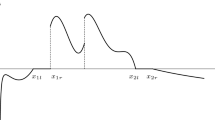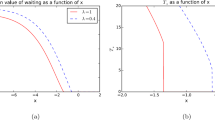Abstract
A review of the optimal stopping problem with more than a single decision maker (DM) is presented in this paper. We classify the existing literature according to the arrival of the offers, the utility of the DMs, the length of the sequence of offers, the nature of the game and the number of offers to be selected. We enumerate various definitions for this problem and describe some dynamic approaches.
Similar content being viewed by others
References
Ben Abdelaziz F, Krichen S (2005) An interactive method for the optimal selection problem with two decision makers. Eur J Oper Res 162:602–609
Chen RW, Rosenberg B, Shepp LA (1997) A secretary problem with two decision makers. J Appl Prob 34:1068–1074
Chun YH, Moskowitz H, Plante RD (1990) Optimal selection strategy for the group interview problem. Deci Sci 24:295–313
Chun YH, Moskowitz H, Plante RD (1994) Dynamic programming formulation of the group interview problem with a general utility function. Eur J Oper Res 78:81–92
Chun YH (1996) Selecting the best choice in the weighted secretary problem. Eur J Oper Res 92:135–147
Cripps M (1998) Markov Bargaining Games. J Econ Dyn Control 22:341–355
Dynkin EB (1963) The optimum choice of the instant for stopping a markov process. Sov Math Dokl. 4:627–629
Enns EG, Ferenstein E (1985) The horse game. J Oper Res Soc Japan 28(1):51–62
Enns EG, Ferenstein E (1987) On a multi-person time-sequential game with priorities. Sequen Anal 6(3):239–256
Enns EG, Ferenstein E (1990) A competitive best-choice problem with poisson arrivals. J Appl Prob 27:333–342
Ferguson TS (1989) Who solved the secretary problem? Stat Sci 4(3):282–296
Fogelman-Soulie F, Munier B, Shakun MF (1983) Bivariate negotiations as a problem of stochastic terminal control. Manage Sci 29(7):840–855
Freeman PR (1983) The secretary problem and its extensions: a review. Int Stat Rev 51:189–206
Gilbert J, Mosteller F (1966) Recognizing the maximum of a sequence. Am Stat Assoc J 61:35–73
Kurano M, Yasuda M, Nakagami J (1980) Multi-variate stopping problem with a majority rule. J Oper Res Soc Japan 23:205–223
Lindley DV (1961) Dynamic programming and decision theory. Appl Stat 10:39–51
Majumdar AAK (1985) Optimal stopping for a two-person sequential game in the continuous case. Pure Appl Math Sci XXII(1–2):79–89
Majumdar AAK (1986) Optimal stopping for a two-person sequential game in the discrete case. Pure Appl Math Sci XXIII(1–2):67–75
Majumdar AAK (1987) Optimal stopping for a full-information bilateral sequential game related to the secretary problem. Math Jpn 32(1):63–74
Presman EL, Sonin IM (1975) Equilibrium points in a game related to the best choice problem. Theory Prob Appl XX(4):770–781
Radzik T, Szajowski K (1990) Sequential games with random priority. Sequen Anal 9(4):361–377
Ravindran G, Szajowski (1992) Non-zero sum game with priority as Dynkin’s game. Math Jpn 37(3):401–413
Rose JS (1984) Twenty years of secretary problems: a survey of developments in the theory of optimal choice. Adv Manag Stud 1(1):53–64
Roth A, Kadane JB, DeGroot MH (1977) Optimal peremptory challenges in trials by juries: a bilateral sequential process. Oper Res 25(6):901–919
Sakaguchi M (1977) A sequential allocation game for targets with varying values. J Oper Res Soc Jpn 20(3):182–193
Sakaguchi M (1978a) When to stop: randomly appearing bivariate target values. J Oper Res Soc Jpn 21(1):45–57
Sakaguchi M (1978b) A bilateral sequential game for sums of bivariate random variables. J Oper Res Soc Jpn 21(4):486–507
Sakaguchi M (1978c) Dowry problems and OLA policies. Rep Stat Res JUSE 25(3):124–128
Sakaguchi M (1980) Non-zero-sum games related to the secretary problem. J Oper Res Soc Jpn 23(3):287–292
Sakaguchi M (1984a) Bilateral sequential games related to the no-information secretary problem. Math Jpn 29(6):961–973
Sakaguchi M (1984b) A time-sequential game related to an arbitration procedure. Math Jpn 29(3):491–502
Sakaguchi M (1985a) The bilateral secretary problem with a random population size. Math Jpn 30(3):457–469
Sakaguchi M (1985b) Non-zero-sum games for some generalized secretary problems. Math Jpn 30(4):585–603
Sakaguchi M (1988) Linear Programming formulations for games with multiple payoffs. Math Jpn 33(1):133–145
Sakaguchi M (1989a) Some infinite problems in classical secretary problems. Math Jpn 34(2):307–318
Sakaguchi M (1989b) Multiperson multilateral secretary problems. Math Jpn 34(3):459–473
Sakaguchi M (1989c) Some two person bilateral games in the generalized secretary problem. Math Jpn 34(4):637–654
Sakaguchi M (1991a) Sequential games with priority under expected value maximization. Math Jpn 36(3):545–562
Sakaguchi M (1991b) Best-choice games with random priority on a two-Poisson stream. Math Jpn 36(4):731–745
Sakaguchi M (1992) Sequential deception games. Math Jpn 37(5):813–826
Sakaguchi M (1995a) Optimal stopping games for bivariate uniform distribution. Math Jpn 41(3):677–687
Sakaguchi M (1995b) Optimal stopping games – A review. Math Jpn 42(2):343–351
Sakaguchi M (2000) A best-choice problem for the two streams of IID random variables. Math Jpn 51(3):471–478
Sakaguchi M (2003) Non-zero-sum best-choice games where two stops are required. Scientiae Math Jpn 58(1):137–148
Sakaguchi M, Mazalov V (2004) A non-zero-sum no-information best-choice game. Math Methods Oper Res 60(3):437–451
Salminen P, Teich JE, Wallenius J (1996) A decision model for the multiple criteria group secretary problem: theoretical considerations. J Oper Res Soc 47(8):1046–1053
Stadje (1985) On multiple stopping rules. Optimization 16(3):401–418
Steuer R (1986) Multiple Criteria Optimization: Theory, Computation, and Application. Wiley, New York
Stewart TJ (1981) The secretary problem with an unknown number of options. Oper Res 29(1):130–145
Sweet T (1994) Optimizing a single uncertain selection with recall of observations. J Appl Prob 31:660–672
Szajowski K (1993) Double stopping by two decision-makers. Adv Appl Prob 25:438–452
Szajowski K, Yasuda A (1997) Voting procedure on stopping games of Markov chain. Lecture notes in economics and mathematical system 445:68–80
Villareal B, Karwan MH (1981) An interactive dynamic programming approach to multicriteria discrete programming. J Math Anal Appl 81:524–544
Villareal B, Karwan MH (1982) Multicriteria dynamic programming with an application to the integer case. J Optim Theory Appl 38(1):43–69
Yasuda M, Nakagami J, Kurano M (1982) Multi-variate stopping problem with a monotone rule. J Oper Res Soc Jpn 25:334–350
Yasuda M (1985) On a randomized strategy in Neuveu’s stopping problem. Stochastic Processes Appl 21:159–166
Author information
Authors and Affiliations
Corresponding author
Additional information
Fouad Ben Abdelaziz is on leave from the Institut Superieur de Gestion, University of Tunis, Tunisia e-mail: foued.benabdelaz@isg.run.tn.
Rights and permissions
About this article
Cite this article
Abdelaziz, F.B., Krichen, S. Optimal stopping problems by two or more decision makers: a survey. CMS 4, 89–111 (2007). https://doi.org/10.1007/s10287-006-0029-5
Published:
Issue Date:
DOI: https://doi.org/10.1007/s10287-006-0029-5




